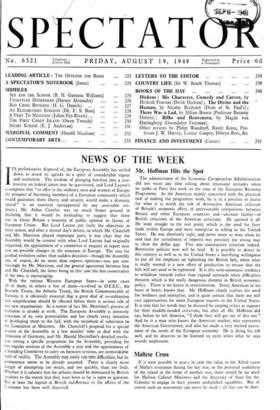Mr. Hoffman Hits the Spot
The administrator of the Economic Co-operation Administration did not waste any time talking about emotional attitudes when he spoke in Paris this week on the state of the European Recovery Programme. As the American mainly concerned with the practical task of making the programme work, he is in a position to assess for what it is worth the talk of destructive American criticism of Britain's economic effort, of unfavourable comparisons between Britain and other European countries and—ultimate futility—ot British criticisms of the American criticisms. He ignored it all. He went straight to the real point, which is the need for freer trade within Europe and more enterprise in selling to the United States. He was absolutely right, and never more so than when he said that the curtailment of imports was precisely the wrong way to close the dollar gap. This was 'constructive criticism indeed. Restrictive policies now will be fatal. It is possible to detect in this country as well as in the United States a horrifying willingness to put all the emphasis on tightening the British belt, when what is really wanted is a new effort of production to ensure that the belt will not need to be tightened. It is this semi-automatic tendency to withdraw inwards rather than expand outwards when difficulties threaten which is the really dangerous element in British economic policy. There is no future in restrictionism. Every American in his heart of hearts knows that. Mr. Hoffman clearly realises the need for boldness and enterprise, and is quite certain that there are still vast opportunities for more European exports to the United States. It is true that his words may be misused by carping critics as support for their muddle-headed criticisms, but after all Mr. Hoffman did say, before he left America, " I think they will get out of this one." And he is a man who knows the American market, who represents the American Government, and who has made a very shrewd assess- ment of the needs of the European economy. He is doing his job well, and he deserves to be listened to, even when what he says sounds unpleasant.


































